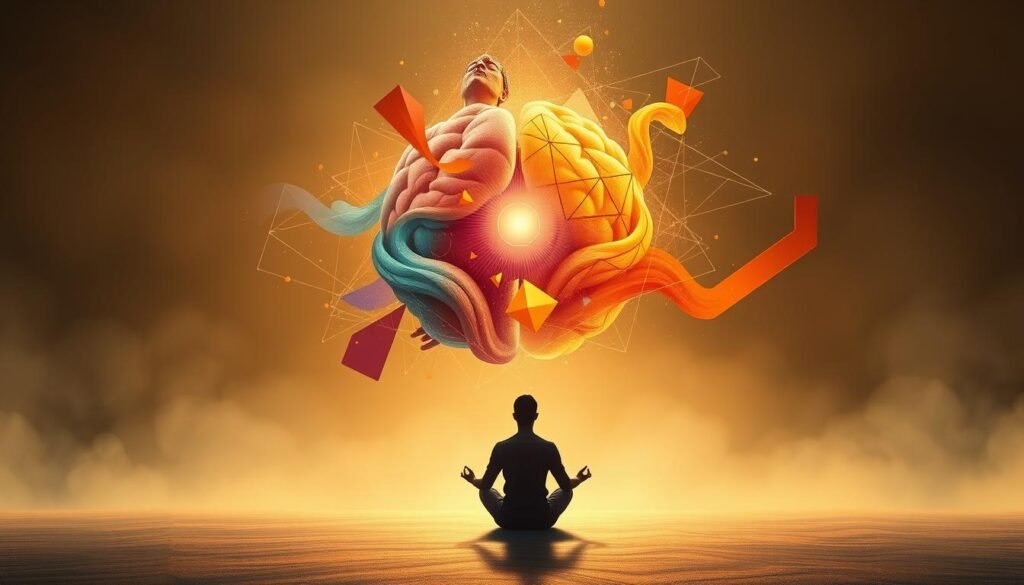Ever feel like your thoughts are stuck in fog? Modern life’s constant demands can leave your brain feeling sluggish. But here’s the good news: your cognitive sharpness isn’t fixed. Neuroscience shows simple lifestyle changes can rewire your brain, making you think faster and focus better.
Research proves neuroplasticity—the brain’s ability to adapt—is boosted by habits like quality sleep and nutrient-rich foods. For instance, a Harvard study found just 20 minutes of daily meditation can strengthen attention spans. Omega-3 fatty acids in walnuts and salmon also support memory retention.
This isn’t about quick fixes. It’s about building routines that work with your biology. Whether you’re tackling deadlines or parenting chaos, small changes create big effects. Below, you’ll find science-backed strategies to cut through mental fatigue and unlock your clearest thinking yet.
Key Takeaways
- Your brain can adapt and sharpen at any age through neuroplasticity
- Sleep quality directly impacts focus and decision-making abilities
- Foods rich in antioxidants boost cognitive performance
- Short mindfulness sessions enhance attention spans
- Physical activity increases blood flow to brain regions linked to memory
Understand the Importance of Mental Clarity
In today’s world, mental clarity is like a compass for your mind. It helps you ignore distractions, focus on what’s important, and make choices that match your goals. Whether you’re working on a project or handling personal tasks, being mentally clear is key to doing things well.
What Is Mental Clarity?
Mental clarity means having clear thoughts without feeling overwhelmed. It’s that “aha” moment when you find solutions easily or complete complex tasks smoothly. Unlike just being aware, it involves sharp memory, logical thinking, and ignoring unnecessary info.
Benefits of Improved Mental Clarity
Being mentally clear brings three main benefits:
- Enhanced productivity: Research shows focused workers finish tasks 50% faster than those who are distracted
- Emotional balance: Clear thinking helps you stay calm under stress, avoiding impulsive reactions
- Creative problem-solving: Studies link mental clarity to 30% more innovation in brainstorming
These advantages aren’t just for work. Being focused also makes hobbies more enjoyable and helps keep relationships healthy. For practical tips to beat brain fog, check out science-backed methods that fit into your daily life.
Nourish Your Brain with a Healthy Diet
What you eat can boost your mental clarity. Your brain needs nutrient-rich foods and enough water to work well. Making simple food choices can improve focus, memory, and decision-making.

Foods That Enhance Cognitive Function
Some foods are natural brain boosters. Walnuts have omega-3 fatty acids that help nerve cells talk to each other. Blueberries are full of anthocyanins, antioxidants that protect brain cells. Dark leafy greens like spinach have vitamin K, which helps with faster thinking and better memory.
| Food | Key Nutrients | Brain Benefits |
|---|---|---|
| Walnuts | Omega-3s, Vitamin E | Supports memory & learning |
| Blueberries | Anthocyanins, Vitamin C | Reduces brain aging |
| Spinach | Vitamin K, Folate | Enhances focus & clarity |
Hydration's Role in Mental Clarity
Water is 75% of your brain. Even a little dehydration can hurt your focus and memory. A study showed that losing 1-2% of body fluids makes solving problems harder and increases tiredness.
To stay sharp, drink water all day. Try herbal teas or water with citrus slices to make it more fun. Aim for 8-10 cups daily, depending on how active you are or where you live.
Incorporate Regular Physical Activity
Your brain works best when you move your body. Exercise isn’t just for muscles; it boosts mental focus naturally. It improves brain chemistry and connects neurons. Let’s see how workouts sharpen your mind and how to fit exercise into your daily routine.
Fuel Your Brain with the Right Movement
Aerobic exercises like brisk walking or cycling release BDNF, a protein for new brain cells. Studies show 30 minutes of cardio five times a week can boost memory and decision-making.
| Exercise Type | Brain Benefit | Weekly Goal |
|---|---|---|
| Yoga | Reduces cortisol by 27% | 3 sessions |
| HIIT Workouts | Boosts dopamine production | 2 sessions |
| Swimming | Enhances oxygen flow to brain | 150 minutes |
Design Your Personal Brain-Boosting Plan
Consistency is key in exercise. Start with these tips:
- Pair activities you enjoy with cognitive benefits (dance + coordination)
- Schedule workouts during natural energy peaks (morning or post-lunch)
- Use fitness trackers to monitor progress and stay motivated
Remember, even 10-minute breaks count. A Journal of Cognitive Neuroscience study found short activity bursts improve problem-solving skills by 18% compared to prolonged sitting.
Prioritize Sleep for Optimal Function
Your brain gets a nightly reset that’s more than just sleep. It’s a biological cleanup process that boosts your daytime focus. While you sleep, the glymphatic system removes toxins linked to brain fog. This makes quality sleep key for improving mental alertness naturally.

How Poor Sleep Sabotages Your Focus
Missing just two hours of sleep can make you 32% less alert, NIH studies show. Chronic sleep loss messes with memory consolidation. This is why you might forget names or struggle with complex tasks after bad nights.
“Adults who sleep 7-9 hours have 40% better problem-solving skills than those sleeping less than six.”
National Institutes of Health
Science-Backed Strategies for Better Rest
Here are some evidence-based tips to improve your sleep:
- Keep your bedroom at 65°F (18°C) for the best sleep
- Wear amber-tinted glasses to block blue light 90 minutes before bed
- Have a 20-minute wind-down ritual like reading or stretching
| Sleep Booster | Impact Level | Implementation Time |
|---|---|---|
| Consistent bedtime | High | 3-7 days |
| Caffeine cutoff by 2 PM | Medium | Immediate |
| White noise machine | Medium | 1 night |
Start your day with sunlight to set your circadian rhythm. Most people see clearer thinking and faster decision-making in two weeks. This shows that smart sleep habits enhance cognitive performance without needing supplements or big lifestyle changes.
Manage Stress Effectively
Stress doesn’t just make you tired—it also hurts your brain’s ability to think. When cortisol, the stress hormone, builds up, it messes with the part of your brain that makes decisions and stays focused. A Harvard study found that too much stress can even shrink your brain.
The good news is that there are simple ways to fight back. By using brain-boosting strategies, you can take back control.
Techniques for Reducing Stress
There are quick, science-backed ways to lower cortisol and improve your focus:
- Progressive muscle relaxation: Tense and release each muscle group for 2-3 seconds, starting from your toes. This signals your body to exit “fight-or-flight” mode.
- Box breathing: Inhale for 4 counts, hold for 4, exhale for 4, pause for 4. Repeat 5 times to calm your nervous system.
- Nature breaks: Even 10 minutes outdoors lowers stress hormones, per Environmental Health Perspectives research.
The Connection Between Stress and Cognitive Function
High cortisol levels over time reduce gray matter in areas linked to memory and emotional regulation. A 2023 study found adults with chronic stress had 8% less prefrontal cortex volume than peers. This makes tasks like planning or solving problems feel overwhelming.
Managing stress isn’t just about feeling better—it’s about protecting your brain’s structure. Tools like mindfulness or guided breathing exercises can rebuild mental resilience. Pair these with daily movement for a complete brain-boosting strategy that keeps your mind sharp under pressure.
Engage in Mindfulness and Meditation
Imagine a tool that quiets mental chatter while strengthening neural connections—mindfulness does exactly that. Research from UCLA shows regular meditation physically changes brain structure. It increases gray matter density in areas linked to learning and emotional regulation.
These adaptations help you process information faster and maintain calm during stressful situations.

How Meditation Sharpens Your Mental Focus
Meditation trains your brain to regulate the default mode network. This system is responsible for mind-wandering and self-referential thoughts. By practicing just 10 minutes daily, you’ll notice improved concentration and reduced mental fatigue.
Studies show meditators develop thicker prefrontal cortex tissue. This enhances decision-making and problem-solving abilities.
Easy Ways to Practice Mindfulness Daily
You don’t need hours of silence to reap the benefits. Try these simple natural cognitive enhancement tips:
- Body scans: Lie down and mentally check in with each body part, releasing tension as you go
- Mindful eating: Focus on the texture, taste, and aroma of each bite during one meal daily
- Breath focus: Count inhales to four and exhales to six while sitting in traffic or waiting in line
Neuroscientists found that participants who did body scans for eight weeks showed 20% better focus during cognitive tests compared to non-practitioners. Start with three-minute sessions and gradually increase as your mind adapts to the practice.
Stay Socially Engaged
Strong relationships do more than warm your heart; they sharpen your mind. Research from Johns Hopkins University shows that adults with active social lives experience 30% slower cognitive decline than those who are isolated. Regular interactions exercise your brain like a muscle, keeping neural pathways flexible and responsive.
The Impact of Social Interaction on Mental Health
Meaningful conversations activate multiple brain regions at once. When you discuss complex ideas or solve problems with others, your brain works better. This helps increase mental sharpness naturally by strengthening cognitive connections.
| Social Activity | Brain Benefits | Weekly Goal |
|---|---|---|
| Group Discussions | Boosts critical thinking & verbal fluency | 2-3 sessions |
| Volunteering | Enhances empathy & emotional regulation | 1-2 hours |
| Learning Clubs | Strengthens memory retention | 1 meeting |
Building and Maintaining Strong Relationships
In today’s digital world, quality connections require intentional effort. Try these science-backed strategies:
- Schedule “no-screen” calls: Dedicate 20 minutes weekly to voice-only conversations with close friends
- Join skill-based groups: Cooking classes or book clubs combine socializing with skill development
- Practice active listening: Nodding and paraphrasing during conversations improves mutual understanding
Remember: It’s not about quantity, but consistency. Fifteen minutes of deep conversation three times weekly can create lasting cognitive benefits.
Challenge Your Mind
Your brain grows stronger when you challenge it, like a muscle with exercise. Adding mental challenges to your day is more than just staying busy. It’s about making your brain better at focusing, being creative, and solving problems. Let’s see how you can make your mind sharper.

Activities That Promote Cognitive Sharpness
Neurobic exercises—activities that use many senses—are great for your brain. For instance, playing a musical instrument works your ears, hands, and eyes at the same time. A study from Cambridge University showed that speaking two languages can delay dementia by up to 5 years. Here are some easy ways to challenge your brain:
- Solve jigsaw puzzles or crosswords for 15 minutes daily
- Learn basic phrases in a new language using apps like Duolingo
- Play strategy-based games like chess or Sudoku
The Value of Lifelong Learning
Staying curious and learning new things keeps your brain sharp. Studies show that adults who learn new skills have better memory and make decisions faster. Here are some ways to keep learning:
- Take online courses on platforms like Coursera or MasterClass
- Attend local workshops on photography, coding, or gardening
- Read nonfiction books outside your usual interests
Dr. Lisa Feldman Barrett, a neurologist, says: “Every time you learn something new, you’re updating your brain’s software.” This idea fits perfectly with methods for clear thinking. It combines curiosity with challenges to improve your mental skills.
Limit Distractions in Your Environment
Your surroundings greatly affect your mental clarity. Studies show that messy environments make your brain work harder. This can lead to better focus if you organize your space and habits.
Strategies for Creating a Focused Workspace
Begin with design tips that help you concentrate. Research from MIT shows multitasking cuts productivity by 40%. Here are some tips backed by science:
- Use zonal lighting – bright lights for work, warm tones for relaxing
- Follow the “20-second rule” – keep distractions out of reach
- Add plants – they boost focus by 15% with better air and calm
Try dopamine fasting for better focus. It involves short periods without new things to look at. Start with 30-minute blocks of:
- No phone alerts
- Focus on one task
- Keep your space tidy
Managing Digital Distractions
Smartphones are picked up 144 times a day, on average. Here are ways to manage your tech:
- Block distracting apps with Freedom or FocusMe
- Take tech breaks every 90 minutes
- Use grayscale mode to make apps less tempting
Make your digital habits harder to follow. Try these changes:
| Default Setting | Improved Version | Focus Benefit |
|---|---|---|
| Email notifications on | Check 3x/day | Less switching between tasks |
| Social media apps on home screen | Hidden in folder | Opens apps 28% less |
| Too many browser tabs | Max 5 with OneTab | Less mental load |
Seek Professional Help When Needed
Self-care strategies like mental clarity techniques can help improve focus. But, some challenges need expert help. Knowing when to seek support shows you care about your mental health.
When Lifestyle Changes Aren’t Enough
Brain fog, forgetfulness, or constant mental fatigue might mean deeper issues. Therapists who use cognitive behavioral therapy (CBT) can help. They focus on thought patterns that affect mental clarity.
Neurofeedback specialists, like those at Neurocore, use brain training programs. These programs help improve focus in measurable ways.
Finding Trusted Mental Health Resources
The American Psychological Association’s psychologist locator helps find licensed professionals. Digital platforms like BetterHelp offer virtual therapy sessions for those with busy schedules. Apps like Headspace provide guided meditation sessions by clinical psychologists.
Choose practitioners who use evidence-based mental clarity techniques. Check their credentials on state licensing boards or with organizations like the Biofeedback Certification International Alliance. Many insurance plans now cover cognitive training programs. Check with your provider about mental health benefits.

